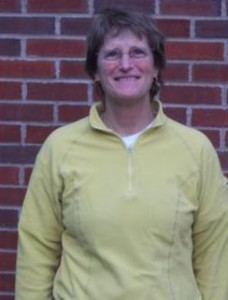University of Rochester
Sustainability @ the
University of Rochester
Recognizing a Green Star at URMC
 March 2012
March 2012
As a fundamental part of being a sustainable institution, the University of Rochester values its recycling programs. However, implementing recycling programs throughout the diverse areas of the University is not always as straightforward as one might think. Working within the sanitation and fire codes that govern medical facilities can be particularly challenging. But it is possible to overcome these challenges through the work and perseverance of green champions, like Joan Shikowitz, RN First Assistant in the Operating Room. Joan has led her department down a sustainable path from spearheading waste reduction efforts to establishing recycling programs for various materials.
Joan’s passion for green initiatives began when she joined her high school’s Ecology club, which was formed in light of the very first Earth Day. This passion is what led to the start of several initiatives Joan began through her position in Strong Memorial Hospital. First, Joan began collecting bottles and cans from within the lunch rooms and surgeons’ lounges. She made signs and posters to remind her fellow employees to recycle. Fellow coworker, Pam Parker, eventually joined Joan to help bring the items to a redemption center. The refund money received from this program is stored in a special fund and donated to departmental employees who suffer from illnesses, injury, or have a special need.
Joan recognized her next opportunity as she noticed employees in her department throwing out non-regulated waste into regulated waste bins. Regulated medical waste undergoes a treatment process before it is sent to the landfill which uses more energy and costs the University more money to dispose of. While it is very important that regulated waste undergoes this process, Joan implemented a “Think Before You Throw” program to educate her co-workers on the difference between “red” (regulated) and “white” (non-regulated) waste. Joan collaborated with the Infection Control department to rewrite the policy on waste disposal while maintaining University standards. Throughout the course of a typical day in the 35 operating rooms there are approximately 120 surgical cases. Before Joan became involved about 2-3 red bags were generated from each room per day. Thanks to Joan’s efforts and employee adherence, the amount was reduced to one red bag with two bags of white garbage.
Joan’s drive to continue to improve would not let her stop there. As her next feat, Joan instituted the recycling of clean plastics and cardboard. The larger boxes that supplies come packaged in were being recycled as supplies were stocked, but a system was not established to collect the smaller boxes sent inside the operating rooms. After Joan’s first steps were made over the course of two years to get this material out of red garbage and into the white garbage instead, she took it to the next level to collect these items to be recycled. In addition to cardboard, clean plastic packaging and fluid bottles (which are mostly plastic numbers 1’s, 2’s and 5’s) are now also recycled in the operation room areas through the same process. When considering that the OR goes through approximately 25,000 boxes of plastic fluid bottles per year, with an average of two bottles per case, the impact recycling these items makes is clear.
While Joan has been the ring leader of these efforts, she has not done it alone. Of course, none of this would be possible without the cooperation of the rest of the Operating Room and Perioperative Services team. Joan has made several presentations to the staff and thrives on feedback from her fellow employees. Joan worked closely with the Environmental Services department as well. But the Perioperative Support Assistants (PSA’s) are an integral part of the process, and without them none of this would be possible. PSA’s are responsible for providing equipment to the operating rooms, transporting and prepping patients, and cleaning operating rooms after cases. The staff of 50 is responsible for emptying the collection containers for recycling and relocating other waste from the operating areas to a central depository.
URMC is also involved in two very important recycling and reuse programs. Through a partnership with Intervol, unused medical products are sent to areas of need, locally, nationally or internationally. One-time-use equipment is also collected and sent to Stryker to be reprocessed and recycled into new equipment. The materials is cleaned, sharpened, and repackaged in a sterile manner to be sold at a reduced cost. Both of these programs are not only environmentally beneficial but have economic benefits as well. Rather than purchasing brand new products there is a reduced cost associated with obtaining recycled and donated items. The University directly benefits by saving money in the disposal costs of these items as well.
Recycling Coordinator, Amy Kadrie, recently recognized Joan as a Strong Star and would like to “personally thank Joan for sticking to what she believes in and making such a big impact in her department. The programs Joan has been involved in have taken time and determination to establish. Once programs are implemented, ongoing effort and communication is needed to maintain success.”
Joan is a perfect example of how one person can make a difference. Her efforts continue; she has most recently organized a shelf in the staff kitchen for reusable cups and bowls to be stored, to discourage the use of disposable items. Joan’s advice in driving change is to make it exciting, make it easy, and find other people who believe in the same cause. When asked why she started these initiatives, Joan joyfully responded, “It was the right thing to do.”